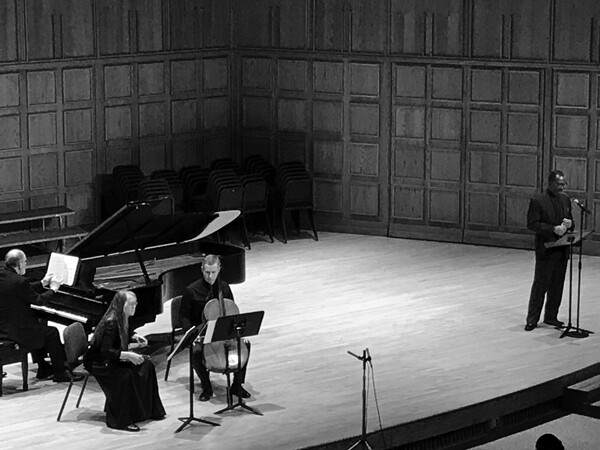Duluth's dark underbelly exposed, exorcised at concert

“Let us be clear,” Jean Perrault told the mostly white audience that had come to hear the world premiere of his We Three Kings on Sunday, March 8, a piano trio tribute to the three innocent young black circus workers who were lynched by a mob in downtown Duluth 100 years ago, “this does not absolve you. There is a long way to go.”
Perrault, director of orchestras and professor of music at the University of Minnesota-Duluth, pointed out to the audience that if they were born in Duluth and their parents were also born in Duluth, chances are likely that someone in the family was among the 10,000 people who made up the mob that took Elias Clayton, Elmer Jackson and Isaac McGhie from the city jail on Superior Street the night of June 15, 1920, and lynched them from a light pole on First Street. That family member, he said, might have been an active participant or one of the many silent witnesses who allowed the dark deed to happen, and, apropos of that situation, he recalled the words of Martin Luther King: “In the end, we will remember not the words of our enemies, but the silence of our friends.”
At the nearly packed 580-seat Mitchell Auditorium on the campus of St. Scholastica, two works were presented in what was called “A Centennial Concert of Healing and Atonement.”
First up was William Grant Still’s Symphony No. 2: Song of a New Race, performed by what was billed as the Centennial Orchestra and Chorus, comprised of members of 24 regional musical organizations, including principal strings from the Duluth Superior-Symphony Orchestra, with a total of 84 musicians.
“We really did succeed in our attempt to form a community-based orchestra and chorus,” Clayton Jackson McGhie Memorial co-chair emeritus Julia Cheng told the Reader after the concert. Cheng was the driving force behind the concert, having conceived of the idea five years ago. She also played cello in the orchestra and sang soprano in the chorus.
For those unfamiliar with the prolific Still (1895-1978), Perrault said he is known as the dean of African-American composers and holds title to many firsts in the American classical music world, including being the first American composer to have an opera produced by the New York City Opera (the 1949 production of Troubled Island, about Haitian revolutionary Jean-Jacques Dessalines) and the first African-American to have work performed by a major American orchestra when the Rochester Philharmonic performed his Symphony No. 1: Afro-American in 1931. Five years later he became the first African American to conduct a major American orchestra (the Los Angeles Philharmonic) in a performance of his own works at the Hollywood Bowl.
Perrault described Still’s second symphony as a Utopian and “absolutely gorgeous” work encompassing the multiracial composer’s idea, as suggested by the title, that a more diverse America was possible.
There seemed in several of the lush, stirring movements of Still’s symphony to be traces of his earliest work with more popular musical styles as when he performed with W.C. Handy, Eubie Blake and Fletcher Henderson, with jazzy elements introduced into the orchestration and what seemed to be a call and response between the muscular brass and strings.
The work concludes with the chorus performing the poignant “...And They Lynched Him on a Tree,” which alternates between the words of the white mob and the grieving mother of the lynched man, who cries, “Oh Jesus, my Jesus, what have they done?”
She is followed by a male narrator who recounts the dead man’s life, saying he was loved but “fell on evil days” and when he ended up in jail, the full chorus intones, “Justice was too slow, the white man said.”
The mother – soulfully sung by social worker Diona Johnson, sent chills with her intonation of “Oh sorrow” – returns a final time to ask why couldn’t they let him be and “not die like this on a roadside tree?”
The chorus then returns for the final ominously cast thoughts:
“Clear the long dark shadow that falls all across your land.
O, trust your brother and reach out your hand,
And clear the shadow, the long dark shadow,
That falls across your land.”
Perrault conducted all but the choral movement of the work, which was conducted by Josh Aerie, a former Duluth resident who now serves as music director of the Columbus Symphony Orchestra in Columbus, Indiana. Aerie returned for the second half, performing cello in the Gichigami Piano Trio for the world premiere of Perrault’s magnificent We Three Kings.
Perrault returned to the stage to introduce his new work, which was commissioned by the Clayton Jackson McGhie Memorial (an organization founded in 2000 to help Duluth remember its checkered past) specifically for this occasion to mark the 100th anniversary of one of Duluth’s darkest days. He promised that after Still’s piece, the atmosphere would “spiral down further,” and explained where some of his musical inspirations came from, beyond the obvious racial problems that resulted in the 1920 lynching and that still plague us today.
“This is not who we are,” Perrault said, yet reminded us, “This was our reality.”
While he took one of Still’s thematic elements for his own, pianist Sam Black demonstrated how Perrault had slowed it down for his own work. He also noted that we would hear snatches of spirituals such as “Sometimes I Feel Like a Motherless Child” and “Amazing Grace,” as well as a segment of “America the Beautiful.”
Joining Black and Aerie in the Gichigami Piano Trio was violinist Laurie Bastian, who also served as concertmaster and principal violinist for the Centennial Orchestra. The Trio gave a thrilling performance of Perrault’s dark, insistent, brooding, mournful, moving, modern and sometimes menacing work.
Opening the concert, Julia Cheng asked the rhetorical question, why do we keep talking about the 100-year-old lynching? She answered by saying that without that talk, there is no healing or atonement.
“Words are easy to forget,” she said. “It’s about what you feel.”
And she hoped that the transformative nature of the music would imprint on everyone in attendance, and each listener would carry that into the wider world “for a more just and merciful world.”
“If that happens,” Cheng said, “their deaths will not have been in vain.”
Other Clayton Jackson McGhie Memorial events include (stay tuned for more details on each):
April 16 – A Readers Theater event with excerpts of pieces to create historical context and memorialize Clayton, Jackson and McGhie.
May 15 – Alabama 35 audio documentary that includes interviews with people who traveled to the Peace and Justice Memorial in Montgomery, Ala.
June 10-15 – The annual CJMM dinner, art shows, a cemetery gathering and a rally in downtown Duluth with keynote speaker Bryan Stevenson.
